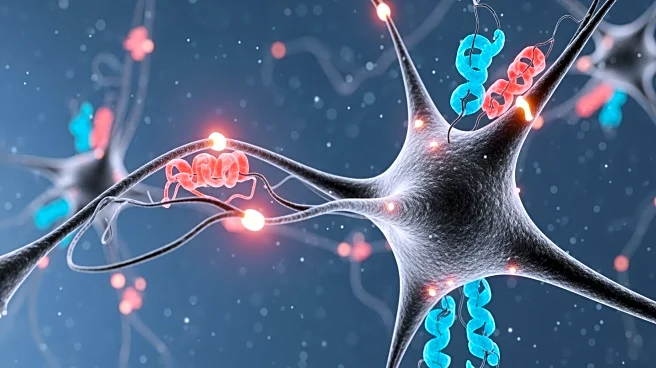What's Happening?
Recent research has focused on the accelerated cellular degradation in ALS-vulnerable motor neurons, particularly in zebrafish models. The study highlights the role of TDP-43 loss in amplifying autophagic
flux in large spinal motor neurons (SMNs). Using a ratiometric autophagic flux probe, researchers observed that larger SMNs exhibit higher autophagic activity compared to smaller neurons. This increased activity is linked to the vulnerability of these neurons in ALS. The study also explored the ubiquitin-proteasome system (UPS), finding it more active in larger SMNs, suggesting a general activation of intracellular degradation systems. The research further examined the unfolded protein response (UPR), indicating that large SMNs accumulate high levels of misfolded proteins, contributing to cellular degradation.
Why It's Important?
This research is significant as it provides insights into the mechanisms underlying ALS, a debilitating neurodegenerative disease. Understanding the role of TDP-43 and the enhanced autophagic flux in motor neurons can lead to potential therapeutic targets for ALS. The findings suggest that cellular degradation systems, including autophagy and UPS, are crucial in maintaining neuronal health and preventing degeneration. This could influence future research directions and drug development aimed at modulating these pathways to protect vulnerable neurons in ALS patients.
What's Next?
Further research is needed to explore the therapeutic potential of modulating autophagic and UPS activity in ALS. Investigating the specific roles of MiT/TFE transcription factors in autophagic flux could provide deeper insights into the disease mechanisms. Additionally, understanding the cell-type specific roles of these factors may lead to targeted therapies that can mitigate neuronal vulnerability in ALS. Continued studies on the genetic mutations affecting TDP-43 and their impact on cellular degradation pathways will be crucial in developing effective treatments.
Beyond the Headlines
The study raises ethical considerations regarding genetic research and manipulation in disease models. It also highlights the importance of interdisciplinary approaches combining genetics, cellular biology, and neuroscience to tackle complex diseases like ALS. Long-term, this research could shift the focus towards personalized medicine, where treatments are tailored based on individual genetic profiles and cellular responses.










